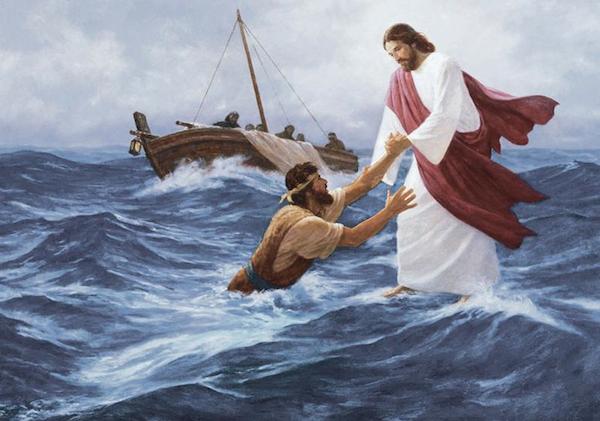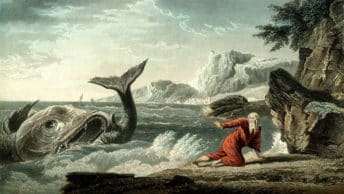One April day in 1993, two friends—Donald and John—set off from Charleston, South Carolina in Donald’s forty-six foot boat Perseverance on a two-day cruise to Fort Lauderdale in Florida. By the middle of the second day, heavy clouds had set in, and the ocean became very rough. Donald was foolishly sitting in the stern without wearing his life vest, and a heavy wave knocked him over the side. John, manning the helm, wasn’t aware of this, and the boat continued on, while Donald cried for help in vain. Soon he was all alone; the water temperature was low enough that hypothermia would set in if he didn’t keep moving—but he was afraid his movements might cause a cramp or attract sharks. It had been years since Donald had prayed, but he said aloud, “God, You’re using some drastic measures to get my attention. I’m sorry I haven’t been smart enough to listen to You. But if You let me live, I’ll fulfill Your mission for me, whatever it might be.” Then Donald thought he heard a voice, but it didn’t sound like God, because it said, “You’re not going to get out of this situation, so just give up, relax, and die peacefully.” “No!” shouted Donald; “I’m going to keep fighting.” The voice seemed to say, “Let go, Don, let go; it would be so easy,” but he insisted, “I won’t give up, no matter what!”
After an hour Donald thought he heard a motor, and he turned and saw his friend John on board the Perseverance, scanning the horizon with binoculars. John spotted him and tossed him a line, but Donald was too exhausted to grasp it in his hand. He passed out for a moment, and when he awakened in a daze, he felt two sets of strong hands, one on either side of him, pulling him through the water. Donald wondered, “Where did John find an extra person to help him rescue me?” Upon reaching the boat, Donald realized he didn’t have the strength to climb the ladder, but then he felt himself being pushed up from below, while on the boat John was able to reach down, grab him, and help pull him aboard. A Coast Guard helicopter whisked Donald off to a hospital in Florida, where he was treated for hypothermia over the next four days. When John came to visit him, Donald asked, “Who helped you pull me into the boat?” “What are you talking about?” John said; “I was all alone.” “No,” insisted Donald; “I felt you and somebody else in the water pushing me up.” John answered, “Well, my friend, somebody from Heaven must have been working overtime to save you, because I was alone in the boat the whole time.” Donald realized he had been the recipient of a miracle, and from then on he dedicated himself to listening for God’s voice and striving to do His will (Joan Webster Anderson, Where Miracles Happen, pp. 28-31). The moral of this true story is simple: as long as we’re willing to do our part, God will not let the storms of life overcome us.
I suspect that anyone who spends a lot of time out on the water eventually has two different but related thoughts: “How small and insignificant I am compared to all that I see around me,” and “How great must be the God Who created all this.” As fishermen, St. Peter and the other apostles surely thought this way, especially when they became fearful upon seeing Jesus coming toward them in the midst of the storm. After being reassured by the Lord, Peter actually started walking toward Him on the water—until a little voice began speaking in Peter’s consciousness: “You’re not able to do this; you’re not going to get out of this situation, so give up, accept the inevitable, and drown.” Peter let himself be influenced by the temptation to think in this negative manner; he focused more on his fears than on the Lord’s presence, so he began to sink. Fortunately, he had the presence of mind to call out for Jesus to help him, and so he was saved.
What about us—do we gaze upon the Lord and listen to His call, or do we give our attention to other voices that surround us? In addition to his own sly temptations, the devil uses other people, and society as a whole, in an effort to trick, discourage, and intimidate us. We can easily hear voices which tell us such things as “You still listen to the teachings of the Church? C’mon, this is the 21st century—no one takes religion seriously anymore,” or “Give in to your physical appetites and secret desires; after all, everyone else does,” or “When Jesus said ‘love your enemies and forgive those who wrong you,’ He wasn’t thinking of the sort of people you have to deal with, so His words don’t count in your case,” or “All the bad luck and misfortune you’ve been having lately means God doesn’t love you anymore, so don’t waste your time trying to obey Him or serve Him,” or “Your problems are so overwhelming and your life is so miserable you might as well just give up and wait to die—not that anyone will care.” Just as Donald was assaulted by a sinister, inner voice telling him everything was hopeless and urging him to quit clinging to life even as rescue was on the way, so the world, the flesh, and the devil are constantly urging us to pack it in, ignore our spiritual duties, and start thinking only of ourselves—advice which, if followed, can only lead to disaster.
God, however, reassures us that because of His all-knowing and all-powerful love, none of life’s storms need ever overwhelm us—if we place our trust and our hope in Him. Satan doesn’t want us to hear and believe this message, so he uses our busy technological society to shout at us and assault us with constant noise, stimulations, and distractions, in hopes of drowning out the Lord’s voice. That’s why, like the prophet Elijah, we have to learn to ignore the loud clamorings of the world and instead listen to the tiny whispering God often uses to speak to us, a holy and loving voice or sense of direction that can be discovered in the teachings and sacraments of the Church, in the beauty of creation and the simple joys of life, and in our own prayerful efforts to be quiet and humble in the Lord’s presence.
Donald’s boat was named the Perseverance, and fortunately for him, he lived up to this name, refusing to give in even as the temptations of death and despair surrounded him. We too are called to overcome discouragement and never cease believing in God’s tender and personal care for us. As Jesus showed the apostles during their turmoil on the Sea of Galilee, He is stronger than any of the storms that frighten or endanger us—and by our willingness to trust in Him, we too must proclaim, “Truly, You are the Son of God.”








